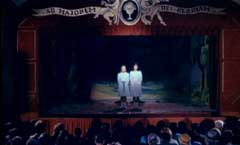Movie Reviews That'll Put Yer Eye Out, Kid!

Don't Deliver Us From Evil (1970)
Someone once wrote: Cruelty in the young is like arthritis in the elderly - it's in their bones. I remember first reading this ridiculous generalization when I was a teenager and it made me so angry that I immediately set to picking on cripples and tripping old women whenever possible (activities I'm proud to admit I still engage in regularly, even if the arthritis creeping into my knees has slowed me down just a smidge). The controversial French film, Don't Deliver Us From Evil reminded me of this quote as it deals, in part, with the seductive power of human cruelty and the influence it can produce on young, impressionable minds. If this last bit sounds like you, take heed, for to continue reading this review will surely be at your own eternal detriment and damnation.
Anne and Lore are best buds at a convent for young girls. At night they enjoy hiding under the blankets with a flashlight and reading sordid stories with a nun sternly patrolling the row of beds nearby. Anne and Lore also like faking crude confessions because it's fun to flabbergast priests who are prone to turning pink. In addition to rectorial arousal, the carnal compatriots enjoy peering through keyholes at naughty nuns, and, as written in Anne's journal, have also renounced Christ and dedicated themselves to lives of dirty deeds - which means lots and lots of sinning for Satan!

Whatever Lore and Anne might get up to at the convent pales significantly when compared to what the young lassies do at home on the weekends. Whether it's taunting and teasing a simpleton with their naughty nubility, setting haystacks all aflame, or poisoning the gaping gardener's beloved birds, behind their innocent faces and flower-print dresses, what began as a blossoming friendship has deteriorated into a ghastly pact of cruelty and evil most vile.
Don't Deliver Us From Evil was inspired by the true story of Pauline Parker and Juliet Hulme, two teenage murderesses who shocked all of New Zealand in 1954 - a story which subsequently became known to modern movie audiences when Peter Jackson successfully adapted it into his 1994 film, Heavenly Creatures. Unlike Jackson's film however, any possible success that Don't Deliver Us From Evil may have enjoyed upon its initial release was not to be had. The film immediately ignited controversy, due in large part to its blasphemous depictions, and as was often the fate of such films , Don't Deliver Us From Evil was ultimately banned.
Even today it's easy to see why the movie might have created such a stir - especially with all the recent controversy over religions being depicted negatively in the media. More than being merely an exploitative film, the director of Don't Deliver Us From Evil, Joel Seria, derived much of his antipathy towards the Catholic church from negative personal experiences he had growing up. This repellency for the strictures that religion enforces, as well as its inherent contradictions, is felt strongly throughout Don't Deliver Us From Evil, and is the fuel for some of the film's blasphemously startling sequences and most memorable moments.

The rebellious and cruel nature of Anne and Lore, and the movie itself, make a strong impression and are a major part of what makes the viewing experience distinctively memorable. To an extent, these anarchistic aspects of Don't Deliver Us From Evil also verge into the realms of surrealism, but not necessarily in terms of any specific visual execution (except for perhaps the radical use of violence). Rather, there seems an almost ideological kinship - a revolt against false reality and the supressive, moralistic constructs which shape and structure much of our existence.
Lore and Anne seems to operate within a constructed reality of their own, where they derive pleasure from cruelty and are not bound by social mores or ethical restrictions. The film does not appear to be interested in either condoning or damning their actions, but instead, presents their story without judgment, thus, leaving any judgment-making up to the viewer. It is interesting however, to contrast the way in which the film portrays Anne and Lore as being aware and alive, whereas those around them seem somewhat less so, as though they are trapped in some kind of hypnotic haze. Take for example the humorously blank reactions of a congregation absentmindedly listening to a sermon, and at the end of the movie, a theater audience that seems equally entranced but unable to fully comprehend what they are hearing and seeing. To put it more clearly, it is as if the roles have been reversed and the actors are in the audience watching reality unfold onstage.

The link to surrealism is further solidified during a scene in which the girls read from Maldorer, written by Le Compte de Lautreamont, an author championed by the surrealists, and from whom was derived the famous quote used to "describe" surrealism, "beautiful as the chance meeting on a dissecting table of a sewing machine and an umbrella."
As far as the technical elements of the film go, Don't Deliver Us From Evil was Seria's directorial debut, and quite a debut it is. The film is nicely photographed, nothing complex or too showy, but it is rarely boring to look at. In fact, as the movie progresses and the story becomes more "lively" the visual approach also seems to follow suit, matching the narrative with some slightly bolder visual strokes. The film's story and characters are well written, even if they may be unpalatable, or to some, downright repulsive, and the actors, both experienced and amateur, do some exceptional work. For certain viewers the movie may also move a little slowly at first. However, those who exercise patience will find the film to be at least engaging, if not wholly entertaining, and without a doubt, Don't Deliver Us From Evil does deliver a staggeringly powerful ending that will resonate in the mind long after the film is over.

Yet again, the crew at Mondo Macabro have done an exceptional job resurrecting another long-lost, largely unseen beauty, uncut for the first time, and making its U.S. debut. Considering how obscure the movie is, and its sketchy history, Mondo's restoration of the film has ensured that, apart from a few noticeable imperfections, Don't Deliver Us From Evil looks just about as good as one could possibly hope. The film is also presented in French with optional English subtitles.
This special edition disc comes with some great extras that are a fine accompaniment to the movie. First is a featurette entitled Hellish Creatures, in which English writer Paul Buck discusses the movie and the impact it had on him when he first saw it while still in art school. Next, there is an interview with the film's director, Joel Seria, who talks a little about his past, offers insights into his movie, and discusses the production of Don't Deliver Us From Evil. In addition to this, there is an interview with the film's lead actress, Jeanne Goupil, an essay on the film written by Pete Tombs, an art gallery, and finally, a trailer highlighting Mondo Macabro's ever-expanding catalog of movies.
In every way this is a superior release of a significant film that should be vital viewing for fringe film fanatics. Highly recommended!
Originally published at Horrorview.com
Recommended and related product links:
Don't Deliver Us From Evil
Heavenly Creatures
Immoral Tales
Mondo Macabro
Maldoror
1 Responses to “Don't Deliver Us From Evil”
Leave a Reply
About me
Previous posts
Archives
Links
-
The International Walnut Musiquarium
- The Int'l Walnut Amazon Store
- Horrorview
- Internet Movie Database
- The Criterion Collection
- Video Flakes
- Portraits of Fire
- American Cinematheque
- Mondo Macabro!
- Panik House
- Subversive Cinema
- CasaNegra Entertainment
- Dark Sky Films
- Blue Underground
- Synapse Films
- NoShame
- Diskotek
- Kino International
- Zeitgeist Films
- Celluloid & Vinyl
- DVD Maniacs
- Blogcritics.org
- Cinebeats
- Slash and Burn
- Eigazoku
- Omega Channel: Horror Films in Review
- Mondo Digital
- Fangoria
- Rue Morgue
- Film Comment
- Video Watchdog
- American Cinematheque
- Rotten Tomatoes
- XploitedCinema
- Sparks
- Tweet



- The Blog Resource Blog-Watch

And I really did not like this film at all. To see my side go to Spasticsnap's Lost Music.